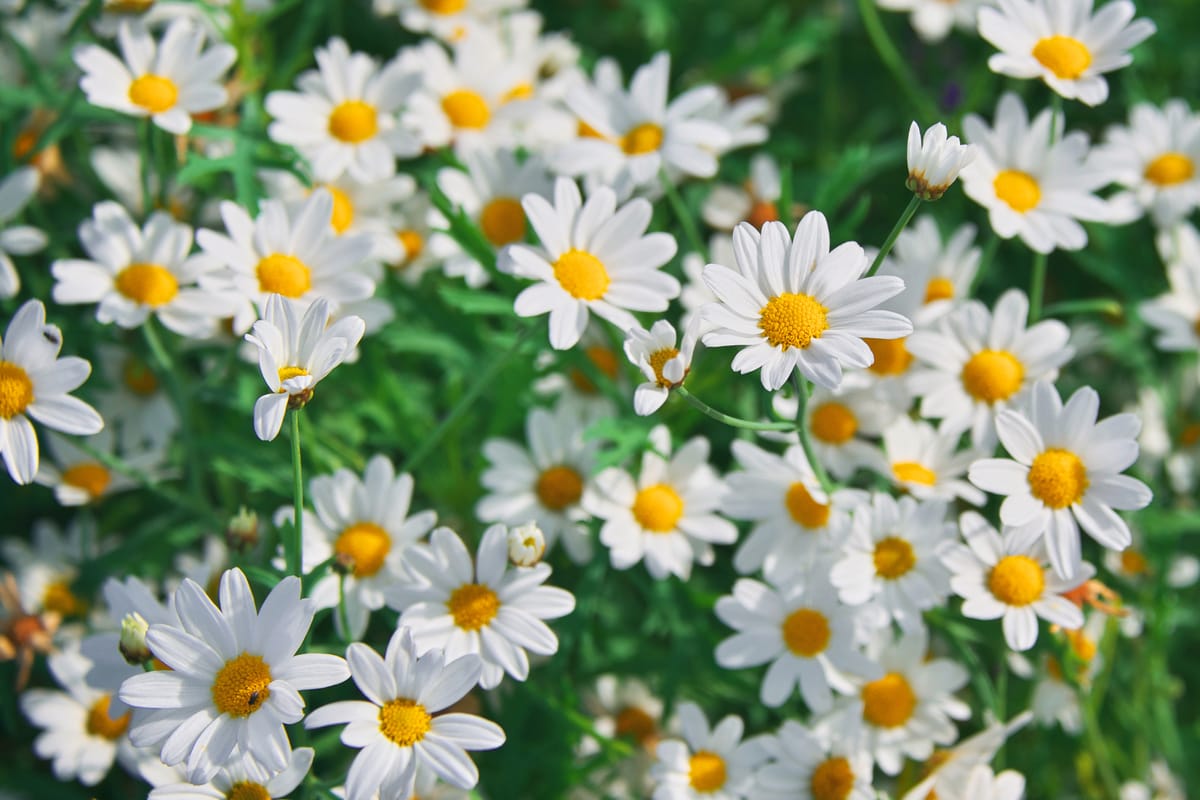Chamomile: The Soothing Herb for Sleep, Stress, and More
Discover the amazing health benefits of chamomile tea. From improving sleep to reducing anxiety, this herbal remedy is a natural way to boost your well-being.

I've got a story to tell you about my love for chamomile tea. Picture this: a stressed-out college student, barely keeping it together, yearning for a moment of peace and a restful night. Enter chamomile tea, my savior in a cup. Just a few sips of this gentle brew, and I could feel my stress levels plummeting. But here's the thing – chamomile had more surprises in store for me than just being a ticket to dreamland.
As I explored further, I uncovered a fascinating truth about chamomile. This modest herb, often overlooked, has been a trusted ally for generations in the battle against anxiety and digestive woes. But it's not just folklore - science is on chamomile's side too. Numerous studies have demonstrated chamomile's ability to alleviate symptoms of generalized anxiety disorder and enhance sleep quality. It's like nature's little helper, hiding in plain sight!
Table of Contents:
- What Is Chamomile?
- Health Benefits of Chamomile
- How to Use Chamomile
- Safety and Precautions
- Chamomile Research and Studies
- Conclusion
What Is Chamomile?
Chamomile is a daisy-like herb that's been around for centuries. It's one of the most popular herbal teas in the world, and for good reason. This soothing tea isn't just delicious, it's packed with potential health benefits too. From easing anxiety to promoting better sleep, chamomile is a true powerhouse in the world of herbal remedies.
Chamomile Plant Family
Chamomile belongs to the Asteraceae family, which includes other well-known plants like sunflowers and marigolds. There are two main types of chamomile used for tea: German chamomile (Matricaria recutita) and Roman chamomile (Chamaemelum nobile). While they come from the same plant family, these two chamomile varieties have some distinct differences. German chamomile tends to be more commonly used for tea, while Roman chamomile is often found in skincare products.
Types of Chamomile
When it comes to chamomile tea, German chamomile reigns supreme. Also known as Matricaria recutita or Chamomilla recutita, this variety produces those classic daisy-like flowers that make chamomile so recognizable. Roman chamomile, on the other hand, is a perennial plant that stays close to the ground. Its flowers are similar to German chamomile, but with a slightly different scent. While you can find Roman chamomile in some teas, it's more often used in essential oils and other topical products.
Chamomile Tea Preparation
Brewing a perfect cup of chamomile tea is an art form, but it's easier than you might think. The key is to use high-quality chamomile flowers and give them plenty of time to steep. To make chamomile tea, start by adding about 1 tablespoon of dried chamomile flowers to a tea infuser or sachet. Place the infuser in your favorite mug, then pour in 8 ounces of hot water. Let the tea steep for 5-10 minutes, depending on how strong you like it. If you're using loose chamomile flowers, you can strain them out with a fine mesh sieve after steeping. For a touch of sweetness, try adding a dollop of honey or a squeeze of lemon juice. Sit back, relax, and enjoy the soothing taste and aroma of your homemade chamomile tea.
Health Benefits of Chamomile
Chamomile isn't just a tasty tea, it's also loaded with potential health benefits. From improving sleep quality to soothing an upset stomach, this humble herb has been used for centuries to support overall wellness. As someone who's experienced the power of chamomile firsthand, I can attest to its calming effects. Whenever I'm feeling stressed or anxious, a warm cup of chamomile tea helps me unwind and find my center again.
Chamomile for Sleep
One of the most well-known benefits of chamomile is its ability to promote better sleep. The antioxidant apigenin, found in chamomile, binds to specific receptors in your brain that may reduce insomnia and induce sleepiness. I've found that drinking a cup of chamomile tea about an hour before bed helps me drift off to sleep more easily. The soothing aroma and warm sensation of the tea seem to signal to my body that it's time to relax and unwind.
Chamomile for Anxiety
In addition to promoting better sleep, chamomile may also help ease anxiety and stress. The flavonoids in chamomile, particularly apigenin, have been shown to reduce anxiety by binding to benzodiazepine receptors in the brain. As someone who deals with occasional anxiety, I've found chamomile tea to be a gentle and effective way to calm my nerves. Sipping on a warm cup of tea helps me feel more grounded and centered, even in the midst of a hectic day.
Chamomile for Digestive Issues
Chamomile has long been used as a natural remedy for digestive issues like upset stomach, indigestion, and bloating. The anti-inflammatory properties of chamomile may help soothe the digestive tract and reduce discomfort. Whenever I'm feeling a bit queasy or bloated, I reach for a cup of chamomile tea. The warm, soothing liquid seems to settle my stomach and ease any discomfort. Plus, the act of sipping on tea can be a calming ritual in itself.
Chamomile for Skin Health
Chamomile isn't just good for your insides, it may also benefit your skin. Thanks to its anti-inflammatory and antimicrobial properties, chamomile has been used topically to soothe irritated skin and promote healing. I like to use chamomile tea as a gentle toner for my face. After steeping a cup of tea, I let it cool completely, then apply it to my skin with a cotton pad. The soothing liquid helps calm any redness or irritation, leaving my skin feeling soft and refreshed.
Potential Benefits for Heart Health
While more research is needed, some studies suggest that chamomile may support heart health. Chamomile is a great source of flavone antioxidants, which have been linked to a lower risk of heart disease. As someone with a family history of heart issues, I'm always looking for natural ways to support my cardiovascular health. Incorporating chamomile tea into my daily routine feels like a simple yet effective way to give my heart a little extra love.
Chamomile and Blood Sugar Control
Some preliminary research suggests that chamomile tea may help support healthy blood sugar levels. While more studies are needed, the potential blood sugar-regulating effects of chamomile are promising. As someone who's mindful of my blood sugar levels, I appreciate any natural ways to keep them in check. Sipping on chamomile tea throughout the day feels like a tasty and comforting way to support my overall health and well-being.
Key Takeaway:
Chamomile is a versatile herb that goes beyond just being a soothing tea. It's known for calming anxiety, promoting better sleep, aiding digestion, and even improving skin health. Whether you're sipping it before bed to catch some Zs or using it as a natural remedy for an upset stomach, chamomile packs a powerful punch in supporting overall wellness.
How to Use Chamomile
Chamomile is one of the most beloved herbs around, and for good reason. It's been used for centuries to promote relaxation, ease digestive issues, and even treat skin conditions. But how exactly do you use this versatile herb? Let me break it down for you.
Drinking Chamomile Tea
The most common way to enjoy chamomile is by brewing a soothing cup of tea. It's incredibly simple - just steep a chamomile tea bag or loose chamomile flowers in hot water for 5-10 minutes, then strain and enjoy. I like to add a touch of honey for sweetness, but you can also drink it plain or with a slice of lemon. The key is to let it steep long enough to really infuse the water with all those beneficial compounds. Chamomile tea is my go-to when I'm feeling stressed or having trouble sleeping. There's just something so calming about the act of sipping a warm mug of this fragrant herbal tea. And the best part? Chamomile tea is caffeine-free, so you can drink it any time of day without worrying about it keeping you up at night.
Chamomile Supplements
If you're not a fan of tea or want a more concentrated dose of chamomile, supplements might be the way to go. You can find chamomile in capsule form, which is super convenient for on-the-go use. Chamomile supplements are often used to promote relaxation, ease anxiety, and even help with digestive issues like bloating and gas. Just be sure to follow the recommended dosage on the product label and talk to your doctor before starting any new supplement regimen. In my experience, chamomile supplements can be a great addition to a stress-management routine. I like to take them in the evening to help me wind down before bed.
Chamomile Essential Oil
Chamomile essential oil is another powerful way to harness the benefits of this herb. It has a sweet, apple-like aroma that's incredibly soothing to the senses. You can use chamomile oil in a diffuser to fill your space with its calming scent, or dilute it with a carrier oil and apply it topically to your skin. I love adding a few drops to my bathwater for a relaxing soak at the end of a long day. Chamomile oil is also great for skincare - it has anti-inflammatory properties that can help soothe irritated skin and even treat conditions like eczema and psoriasis. Just be sure to do a patch test first to make sure you don't have any sensitivities.
Topical Application of Chamomile
Speaking of skincare, did you know that chamomile can be used topically as well? Chamomile creams, ointments, and even compresses can be incredibly soothing for the skin. I like to make a simple chamomile compress by steeping chamomile tea bags in hot water, letting them cool slightly, then applying them directly to my skin. It's great for soothing puffy eyes, sunburns, and even minor cuts and scrapes. You can also find chamomile-infused skincare products like lotions, creams, and salves. These can be helpful for managing conditions like eczema, psoriasis, and even acne. Just be sure to choose products from reputable brands and do a patch test first to check for any allergic reactions.
Safety and Precautions
While chamomile is generally considered safe, there are a few things to keep in mind before using it regularly.
Potential Allergic Reactions
Some people may experience allergic reactions to chamomile, especially if they're allergic to related plants like ragweed, daisies, or chrysanthemums. Symptoms can include itching, swelling, and difficulty breathing. If you notice any of these symptoms after using chamomile products, discontinue use immediately and consult with your healthcare provider. It's always a good idea to do a patch test before using chamomile topically, just to be safe. Apply a small amount of the product to a small area of skin and wait 24 hours to see if any reaction occurs.
Drug Interactions
Chamomile may interact with certain medications, including blood thinners, sedatives, and antidepressants. If you're taking any prescription medications, it's important to talk to your doctor before using chamomile regularly. Chamomile may also interact with other herbs and supplements, so be sure to disclose all the products you're taking to your healthcare provider.
Pregnancy and Breastfeeding
There's limited research on the safety of chamomile during pregnancy and breastfeeding, so it's best to err on the side of caution and avoid using it in large amounts. Some studies suggest that chamomile may stimulate the uterus and increase the risk of miscarriage, especially in high doses. If you're pregnant or breastfeeding, talk to your doctor before using chamomile in any form.
Dosage and Safety Guidelines
When it comes to chamomile, more isn't necessarily better. It's important to follow the recommended dosage guidelines on product labels and not exceed the suggested amount. For chamomile tea, a typical dosage is one or two cups per day. For supplements, follow the instructions on the product label and don't take more than the recommended amount. If you're using chamomile essential oil, be sure to dilute it properly with a carrier oil before applying it to your skin. A general rule of thumb is to use 2-3 drops of essential oil per teaspoon of carrier oil. And of course, if you have any concerns or questions about using chamomile, don't hesitate to talk to your healthcare provider. They can help you determine if chamomile is right for you and guide you on safe usage.
Key Takeaway:
Chamomile is a go-to for relaxation and has multiple uses, from calming teas to soothing oils. Remember to steep your tea properly, consider supplements for a direct approach, use oil in baths or diffusers for relaxation, and try it topically on skin. But always check for allergies and consult with a doctor before mixing it with medications.
Chamomile Research and Studies
The world of chamomile research is a fascinating one. But here's the thing - there's still a lot we don't know about this powerful little flower. The National Center for Complementary and Integrative Health (NCCIH), part of the National Institutes of Health (NIH), supports research on chamomile's potential health benefits and safety. They're the go-to source for the latest and greatest in chamomile studies. But even with their support, the research is limited. We need more studies on chamomile in humans for specific conditions. A lot of the existing research looks at products that combine chamomile with other herbs, which makes it tough to pinpoint chamomile's role.
Clinical Trials on Chamomile
Clinical trials are the gold standard when it comes to testing the effectiveness and safety of any herb or treatment. And chamomile has had its fair share of clinical trials. These studies have explored chamomile's effects on everything from sleep quality and anxiety to digestive issues. Some have shown promising results, but we still need more research to say anything definitive.
Systematic Reviews and Meta-Analyses
Systematic reviews and meta-analyses are like the superheroes of the research world. They take a bunch of individual studies and analyze them together to get a clearer picture of the overall evidence. A 2022 review by Dai and colleagues did just that for chamomile. They looked at chamomile's traditional uses, chemical makeup, pharmacological activities, and quality control. It's a great resource for anyone wanting a comprehensive overview of the current state of chamomile research.
Chamomile and Sleep Studies
As someone who has struggled with sleep issues, I'm always interested in natural remedies like chamomile. And the research on chamomile and sleep is intriguing. A randomized, double-blind, placebo-controlled study found that chamomile extract improved sleep quality and reduced fatigue in elderly individuals with insomnia. That's a mouthful, but basically, it means the study was well-designed and the results are promising. Of course, we need more studies to confirm these findings and figure out the best dosage and duration of chamomile use for sleep. But it's a great starting point.
Chamomile and Anxiety Research
Chamomile is probably best known for its calming properties. And there's some science to back that up. A 2022 comprehensive review by Sah and colleagues looked at chamomile's therapeutic applications, including its potential anti-anxiety effects. The review highlights chamomile's bioactive compounds, like apigenin, which may be responsible for its relaxing properties. But again, more human studies are needed to really understand chamomile's role in managing anxiety. The NCCIH is currently funding research on chamomile's effects on anxiety and other conditions, so hopefully, we'll have more answers soon. The bottom line? Chamomile shows promise for a variety of health issues, but the research is still in its early stages. As more high-quality studies are conducted, we'll have a better understanding of this ancient herb's true potential. In the meantime, I'll keep sipping my chamomile tea and enjoying its soothing effects. And you can bet I'll be keeping a close eye on the latest research developments. Stay tuned.
Key Takeaway:
Chamomile's potential for improving sleep, reducing anxiety, and more is backed by some studies but we definitely need more research to fully understand its benefits. Sipping on chamomile tea might just be a good idea while we wait for science to catch up.
Conclusion
So there you have it - the incredible benefits of chamomile. From easing anxiety to promoting better sleep, this little herb packs a powerful punch. And the best part? It's all-natural, so you can feel good about adding it to your daily routine.
Chamomile: a small flower with a big impact on your well-being. This herb has been used for centuries to promote relaxation and support overall health. You can enjoy chamomile as a tea, a supplement, or an essential oil – the choice is yours! By incorporating chamomile into your life, you're giving your mind and body a natural boost. Go ahead, try it, and feel the difference for yourself.
Picture this: you, curled up with a steaming mug of chamomile tea, feeling the warmth spread through your body as the worries of the day fade away. It's not just a dream – it's the reality that awaits you when you embrace the magic of this incredible herb.




